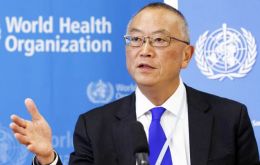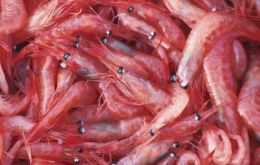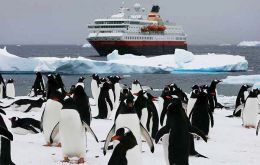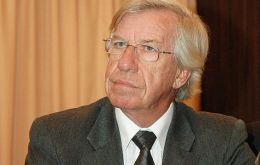MercoPress. South Atlantic News Agency
Stories for April 2015
-
Thursday, April 30th 2015 - 10:08 UTC
Only 34 countries with plans to fight threat of antibiotic resistance, says WHO

Only 34 countries have national plans to fight the global threat of antibiotic resistance, meaning few are prepared to tackle “superbug” infections which put even basic healthcare at risk, the WHO has said. In a survey of government plans to tackle the issue, the World Health Organization said only a quarter of the 133 countries that responded were addressing the problem.
-
Thursday, April 30th 2015 - 07:52 UTC
Brazil raises basic rate 50 points to 13.25%, highest since December 2008

As was anticipated and in line with the current anti-inflation policy, Brazil's central bank on Wednesday evening announced the increase of the basic Selic interest rate another 50 points to 13.25% from 12.75%. The decision from the nine-member Monetary Committee was unanimous, according to the official release.
-
Thursday, April 30th 2015 - 07:46 UTC
“Best brains of Gibraltar” will work together in a Consultative Council

The ‘best brains in Gibraltar’ will work together for the common good under plans for a proposed Gibraltar Consultative Council. The aim is to set up a permanent forum that will work along the same lines as the UK’s Privy Council, providing non-partisan advice to the Chief Minister of the day on issues of national importance, reports the Gibraltar Chronicle.
-
Thursday, April 30th 2015 - 07:29 UTC
Beware: China announces plan to seven-fold increase Antarctic krill catches

Conservation groups and scientists worry that China’s push to boost its harvest of krill -- a shrimp-like creature used for aquaculture feed and human supplements -- may leave Antarctica’s whales, seals and penguins struggling to survive. China’s leaders say they want a seven-fold increase in krill production, according to a recent report in the state-owned China Daily newspaper.
-
Thursday, April 30th 2015 - 07:21 UTC
Number of tourists visiting Antarctica was down, according to IAATO

The number of adventurous tourists visiting Antarctica dipped in the 2014-15 austral season but is expected to bounce back this year, according to visitor totals released by the International Association of Antarctica Tour Operators (IAATO).
-
Thursday, April 30th 2015 - 07:03 UTC
Jewish organizations 'dismayed' by Timerman's 'threats and slanders'

The Argentine-Israel Association, AMIA, expressed on Wednesday great dismay given the “strong threats” in the letter sent by Argentine Foreign minister Hector Timerman announcing he was quitting as member of the century old organization.
-
Thursday, April 30th 2015 - 01:51 UTC
US economy slows down to 0.2% growth in the first quarter, but forecast is optimistic

The US economy “all but stagnated” in the first three months of the year, growing at an annual rate of just 0.2%, official figures show. The growth figure was far lower than expectations, which had forecast growth would be about 1%. Harsh winter weather for a second year dampened consumer spending, while energy companies struggling with low oil prices cut investment.
-
Thursday, April 30th 2015 - 01:24 UTC
Fed leaves interest rate at record low following two-day meeting

The US Federal Reserve has kept its target interest rate at a record low at the end of a two-day policy meeting in Washington, DC. The US central bank has indicated it will raise rates soon, as long as the US economy continued to grow, but the timing of the increase remains uncertain.
-
Thursday, April 30th 2015 - 01:12 UTC
IMF insists with gloomy forecasts for Argentina's economy this year and 2016

The International Monetary Fund (IMF) has repeated its forecast of a 0.3% drop in Argentine GDP over the course of 2015, while recommending a devaluation of the Peso and austerity measures in order to stimulate growth in the economy.
-
Wednesday, April 29th 2015 - 22:59 UTC
Flexibility to discuss trade accords with third parties, Uruguay demands from Mercosur

Brazil's deteriorating economy and the recession tendency in Argentina, Mercosur main and largest partners, are influencing inter-group trade and the Uruguayan government is pressing for more flexibility that should allow it to negotiate agreements or understandings with third parties.
